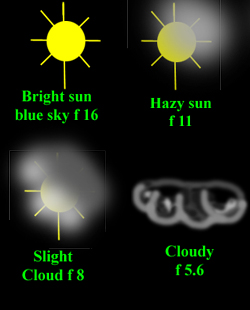Correct
Exposure - Reading
photographic exposure - Guessing the exposure
In the early days of photography
it was quite difficult to calculate the exposure - and many photographers
utilized and educated guess -
Even
today it is useful to be able to guess the exposure in an informed
manner - I know photographers who can do this to about 1/2 a stop
within a very wide range of lighting situations.
Rather
than rely entirely on the electronic metering system to calculate
the exposure its is useful to have an understanding of the approximate
exposure for a subject - If there is a problem with the exposure
system in the camera - perhaps the battery is flat - and the combination
of shutter and aperture do not seem appropriate for the subject
- you can pick up the mismatch and check it.
There
is always some sense guessing exposures before using a light meter
and comparing the difference. This gives the photographer an ever
increasing experience and can help pick up problems like setting
the ISO wrongly or a flat battery. So, with much practice, even
in a wide range of lighting situations, it is possible to guess
light intensities and work out some kind of exposure that will produce
a negative and will allow us to make an acceptable print - the more
you get in the habit of making a mental note of the exposure the
more experienced you will become.
Exposure
Guide
For
sometime through the 1960s and 70s information was printed on a
film packet as a guide to the correct exposure that acted as a rough
guide for exposing that film - similar to the diagram below.
Exposure guide refers to HP5 rated at 400 ASA. Set shutter
speed at 1/500. Then set lens aperture as shown.
|
 |
However what is really
needed is an accurate way of reading the intensity of light and
translating the reading into aperture
f stops and shutter
speeds relative to the film ISO or ASA. This is done
with a light meter.
Historic
lightmeters